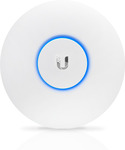The Lite AP hasn't been this cheap since Nov 2019.
Ubiquiti UAP-AC-LITE $119 (Was $149) Pickup Only @ Centrecom
Related Stores
closed Comments

'sactly

For all the reasons the average consumer needs wifi 6…..

Yeah, Apple are selling hardly any iphone 12s /s

Yea, you would need at least 5gb internet and 1000 iPhone 12s to see the real world benefit. I can see the correlation!

@onlinepred: Actually, that's somewhat uninformed. Wifi 6 provides tangible benefits to pretty much everyone that uses wifi. It has far more bandwidth, it's vastly more reliable, and it has significantly advanced spatial streaming over 802.11ac (far better bandwidth separation between devices for concurrent activity), all of which contribute to elimination of wifi as the bottleneck slowing performance and responsiveness of pretty much everything you do. I've been building and supporting wireless networks since the days of 802.11b hardware, let me tell you every business should be ripping out their existing gear and replacing it with wifi 6 APs (almost certainly Unifi) next year, and there's a strong argument for consumers to do the same. Most people 'put up' with low performance, faulty gear because they don't have sufficient knowledge to understand the problems it causes them (most consumers blame poor wifi on their 'Internet' connection). Ubiquiti wifi 6 hardware has the potential to eliminate all those headaches, and is finally a solution that performs well enough that it should last for at least half a decade for the majority of people.

@TrevorX: So you would recommend this for all households with an iPhone 12 or two as they will see tangible benefits?
My business doesn't even have wifi 6 clients yet, so no point in wasting money and ripping our WAPs out lol
You are effectively saying all non wifi 6 unifi products mean users are putting up with "with low performance, faulty gear"

@onlinepred: Wifi 5 clients will see tangible benefits from Wifi 6 APs, so you don't need to replace or upgrade your clients in order to derive benefits.
I've used, managed, and done extensive high-performance testing with a huge range of wifi devices and APs, very few people realise how poorly most 802.11ac APs perform. I went through five Asus USB-AC68's before I finally found one that wouldn't overheat after a few minutes of sustained file copy tests, despite the relatively high price they were basically junk. I've used genuine Intel cards like the AX200 exclusively for wireless wherever possible for years, just as Intel have by far the most reliable client network cards and chips. Most people will put up with weird networking issues affecting the most bizarre things for many years with absolutely no concept of the cause, and most techs not only don't know how to diagnose the issue, they will very actively argue against it, until you stick an Intel i210-T1 in the device and the problem magically goes away…
If you have Ubiquiti 802.11ac hardware, no it's probably not faulty, but if you're using TP-Link/D-Link/Asus/Netgear/Netcom/Linksys yes, you are using potentially faulty gear, and you are DEFINITELY using unsecured, easily hackable gear. We moved to Ubiquiti hardware about eight years ago as we'd been trying to find a range that was affordable for SMB's but was actually reliable, as we'd used all the above brands and more over many years and they were always problematic and couldn't compare with the Cisco/Aruba/Ruckus gear, but that stuff was just way out of the price range for small business budgets. Ubiquiti gear is as reliable as that enterprise hardware at a fraction of the price, we use it for everything.
But yes, if you're using any Wifi 5 APs you are putting up with low performance - we've done real-world throughput tests with Intel AX200's talking to wifi 6 APs that can do file transfers that exceed 100MB/s (around 850mbps sustained throughput). The same device through Unifi Wifi 5 APs can only hit between 35 and 50MB/s within 1m of the AP. And that's best case scenario - in a real world environment with multiple clients accessing the AP at the same time from varying distances performance can degrade rapidly. With wifi 6 multiple clients have next to no impact on each other (as long as the AP isn't bandwidth limited by a single 1gb connection to the switch) and performance is far more consistent within the environment. Deployment of wifi 6 APs will be the first time I've ever been able to say that performance and reliability over wifi is broadly comparable to gigabit LAN connections.
Hey, I get it - you have sunk costs, and you find it difficult to justify replacing it when it seems to do the job fine. And maybe, for the use you put it to, maybe that's true - maybe your bandwidth requirements are always fairly low, you never do large file transfers or stream 4k media or have lots of devices all competing for the same AP. In that case, doing something that will actually expose the limitations of your network is an edge case that you can afford to ignore, because the costs of addressing that are excessive for the benefit you'll derive. That's fine. But it also doesn't mean you don't have a low performance network, it's just that the low performance is something you're happy to live with. And that may be fine for you, and anyone else with a similar situation who chooses to make an informed decision like that. However, for a lot of businesses and a lot of peoples' homes, they will derive tangible benefits from an upgrade, yes even if they are several years away from replacing their client devices with 802.11ax capable wifi.

@TrevorX: What is your job?
"if you're using TP-Link/D-Link/Asus/Netgear/Netcom/Linksys yes, you are using potentially faulty gear, and you are DEFINITELY using unsecured"
This is just plain wrong. Many of those have more warranty, better support, and more reliable software than UniFi. Managing UniFi is a full time job, testing their firmware etc.

@onlinepred: If you haven't read this, I recommend you do so. I read it a few days after it was published, and I immediately connected via command line to every model of Ubiquiti router I had access to, to check the kernel version - every single one was on a fully maintained version and fully patched, despite some of those routers being more than five years old. You couldn't say that about any consumer brand. No, Ubiquiti isn't perfect, but they make reliable products with good quality control, they support their products extremely well throughout their life (they don't orphan them the moment they pass the 12 month old mark like some do), and they actually take security very seriously (their track record is streets ahead of not just consumer brands, but also companies like Cisco).
Better warranty? Yeah, TP-Link have a three year warranty on most of their gear (well at least, they used to). Nearly every single TP-Link device we ever deployed ended up needing replacement within that three year window, I've never come across any brand so consistently bad. Having a longer warranty is irrelevant when the quality of the products is so poor.
Better support? Don't make me laugh. Ubiquiti actually have extremely good support - I've used their support services dozens of times, and have gone right through to engineers who worked with us in real time for hours to diagnose issues and resolve them. Intel have better support for their enterprise products - they'll airbag a replacement mainboard out to us from Singapore that will arrive the next day before we've even taken the faulty one out of the server. But consumer network brands? Their level one service have no real experience or knowledge, they're just reading cue cards. Escalation is difficult, and then you get someone who keeps responding with dismissive answers that don't even relate to the issue you've raised.
If managing a Unifi network is a full time job, you should get another one, because you clearly don't know what you're doing. We have dozens of Unifi networks we directly manage and they require almost no time at all, on an ongoing basis - the controllers auto-update from a script and auto-reboot once a fortnight, watchdogs email support if anything goes offline, and if we need to get in to see what's happening on the network the controller is detailed, granular and very intuitive to work with. We do manually update device firmware, because it's safer having human control in case anything goes wrong, but I honestly don't recall a Ubiquiti device failing a firmware update. That's what, maybe an hour per network every three months or so? Yeah, huge amount of work…
So look, I don't want to be rude, but I think I've spent enough time providing you with detailed explanations to attempt to increase your understanding. I'm just some random on the Internet though, so instead of listening you seem to be dismissing, which is your right I guess, but I really don't have time for it. You're welcome to your opinions, I'm sure you have far more experience and knowledge than me :-)

It's a good AP. If you don't need WiFi 6.
This can run standalone and configured by the UniFi App. Or with a UniFi Cloud Key, UDM or Unifi Controller on Virtual Machine.

This or something like the Deco m5?

This. Better UI and way more features. But you'll need to host the Network Controller via Docker, Raspberry Pi or VPS.

Deco for plug and play.
This if you like to tinker

Decent price.

Will this work with the UAP-AC-LR if they are about 10m apart? I'm finding that the UAP-AC-LR is really struggling to provide Short Range let alone Long Range coverage even after doing lots of channel scanning and changes.

yes it will

Should it be necessary?

Just grabbed one to upgrade my old UAP. Having 5ghz everywhere will be nice :)


WiFi 6 AP Lite coming soon. Just came out of early access I think.